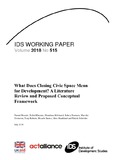What Does Closing Civic Space Mean for Development? A Literature Review and Proposed Conceptual Framework
| dc.contributor.author | Hossain, Naomi | |
| dc.contributor.author | Khurana, Nalini | |
| dc.contributor.author | Mohmand, Shandana | |
| dc.contributor.author | Nazneen, Sohela | |
| dc.contributor.author | Oosterom, Marjoke | |
| dc.contributor.author | Roberts, Tony | |
| dc.contributor.author | Santos, Ricardo | |
| dc.contributor.author | Shankland, Alex | |
| dc.contributor.author | Schröder, Patrick | |
| dc.coverage.spatial | Bangladesh | en |
| dc.coverage.spatial | Brazil | en |
| dc.coverage.spatial | Cambodia | en |
| dc.coverage.spatial | China | en |
| dc.coverage.spatial | Colombia | en |
| dc.coverage.spatial | Ethiopia | en |
| dc.coverage.spatial | Mozambique | en |
| dc.coverage.spatial | Myanmar | en |
| dc.coverage.spatial | Nepal | en |
| dc.coverage.spatial | Pakistan | en |
| dc.coverage.spatial | Russia | en |
| dc.coverage.spatial | Rwanda | en |
| dc.coverage.spatial | Zimbabwe | en |
| dc.date.accessioned | 2018-07-31T14:19:51Z | |
| dc.date.available | 2018-07-31T14:19:51Z | |
| dc.date.issued | 2018-07 | |
| dc.identifier.citation | Hossain, N.; Khurana, N.; Mohmand, S.; Nazneen, S.; Oosterom, M.; Roberts, T.; Santos, R.; Shankland, A. and Schröder, P. (2018) What Does Closing Civic Space Mean for Development? A Literature Review and Proposed Conceptual Framework, IDS Working Paper 515, Brighton: IDS | en |
| dc.identifier.isbn | 978-1-78118-463-9 | |
| dc.identifier.issn | 2040-0209 | |
| dc.identifier.uri | https://opendocs.ids.ac.uk/opendocs/handle/20.500.12413/13962 | |
| dc.description.abstract | What does closing civic space mean for development? Aid donors are concerned about the implications of restrictions on civil society for their partners and programmes, but to date there has been little clarity about what this means for development. This paper summarises the findings of a literature review in support of research on this issue. It concludes that: (a) civic space has changed more than shrunk, although new restrictions affect aid-supported groups disproportionately; (b) new regulations are not all unwelcome, but nonetheless shift power from civic to political actors; (c) how that power shift shapes development outcomes depends on how political elites deploy that power, and in whose interests; (d) while there are instances where civil society has been curtailed to advance ‘developmentalist’ agendas, it more often enables land and natural resource grabbing, or the abuse of labour or other rights of marginalised and disempowered groups; (e) while short-term economic growth is unlikely to be adversely affected, economic crises are more likely in settings where civic space is closed, and it is highly improbable that development has any chance of producing equitable, sustainable, or inclusive outcomes under conditions where civic space is restricted or closing. | en |
| dc.language.iso | en | en |
| dc.publisher | IDS | en |
| dc.relation.ispartofseries | IDS Working Paper;515 | |
| dc.rights | This is an Open Access paper distributed under the terms of the Creative Commons Attribution Non Commercial 4.0 International licence (CC BY-NC), which permits use, distribution and reproduction in any medium, provided the original authors and source are credited, any modifications or adaptations are indicated, and the work is not used for commercial purposes. http://creativecommons.org/licenses/by-nc/4.0/legalcode | en |
| dc.rights.uri | http://creativecommons.org/licenses/by-nc/4.0/ | en |
| dc.subject | Development Policy | en |
| dc.subject | Politics and Power | en |
| dc.title | What Does Closing Civic Space Mean for Development? A Literature Review and Proposed Conceptual Framework | en |
| dc.type | IDS Working Paper | en |
| dc.rights.holder | IDS | en |
| dc.identifier.team | Power and Popular Politics | en |
| rioxxterms.funder | Default funder | en |
| rioxxterms.identifier.project | Action for Empowerment and Accountability Programme | en |
| rioxxterms.version | VoR | en |
| rioxxterms.funder.project | dbf8d2bd-9127-4ded-9360-500ae248604c | en |
Files in this item
This item appears in the following Collection(s)
Except where otherwise noted, this item's license is described as This is an Open Access paper distributed under the terms of the Creative Commons Attribution Non Commercial 4.0 International licence (CC BY-NC), which permits use, distribution and reproduction in any medium, provided the original authors and source are credited, any modifications or adaptations are indicated, and the work is not used for commercial purposes. http://creativecommons.org/licenses/by-nc/4.0/legalcode


